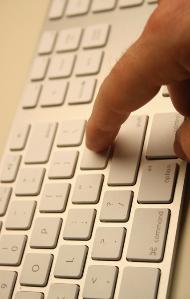Email Etiquette
By Ann Golden Eglé
E-Mail, designed for efficient and immediate communication, has been abused across
the board. While this affects us all, we focus on SPAM instead of what is key—the
effectiveness of our own communication.
Let's investigate how we can improve electronic communication from both a time
management and an etiquette view point.
Since the topic of e-mail comes up in all of my 'Time Management' workshops, I'll
provide suggestions for 'time management' and leave the 'etiquette' to the expert—
Peggy Post from The Etiquette Advantage in Business:
Time Management Saving E-Mail:
- Use the carbon copy (cc) button sparingly. This is the number one complaint I hear.
Only 'cc' those who absolutely need to know, not the entire organization.
- Send only one topic per each e-mail. It's easier for the reader to respond to short e-
mails than to lengthy ones that take more time and consideration.
- State your purpose clearly in the subject line. For example, is this information only
or is action needed?
- Be clear, succinct and use full sentences. If your recipient needs time to decipher
your abbreviations chances are high that they'll become irritated.
- Cut the jokes and lengthy stories that few people have the time to read. They'll treat
your e-mails with more respect if there are fewer of them to read.
Etiquette Suggestions:
- Be cautious not to offend your recipient with tone or caps. Know that they cannot
hear your voice or see your face to get your true meaning.
- Use more traditional forms of communication such as a letter or phone call for
confidential matters. Be considerate of confidential materials you receive.
- If you send a confidential e-mail in error, call the recipient to ask him to delete it
before reading. If you've accidentally sent a 'memo all' out, transmit a blanket
apology and say you hope no one has been offended or angered.
- Know that e-mail is informal communication. The more serious the message, the
less appropriate e-mail becomes as a medium.
- Watch your language, e-mail is no excuse for misspellings and grammatical errors.
Use spell check and know how to compose a successful correspondence.
Even though your recipients cannot see you in person your e-mail correspondence
speaks volumes about who you. Take your e-mails to the next level this week with the
above suggestions. You'll not only elevate your own communication but set an
example for others. Enjoy your discoveries and have a splendid week.
About the author: Master Certified Coach Ann Golden Eglé is passionate about transitioning
good leaders into great leaders, the kind that followers are inspired to follow rather than have to
follow out of duty. Be inspired each week with her innovative 'Success Thought for the Week' as
an aid to your success.
By Ann Golden Eglé
E-Mail, designed for efficient and immediate communication, has been abused across
the board. While this affects us all, we focus on SPAM instead of what is key—the
effectiveness of our own communication.
Let's investigate how we can improve electronic communication from both a time
management and an etiquette view point.
Since the topic of e-mail comes up in all of my 'Time Management' workshops, I'll
provide suggestions for 'time management' and leave the 'etiquette' to the expert—
Peggy Post from The Etiquette Advantage in Business:
Time Management Saving E-Mail:
- Use the carbon copy (cc) button sparingly. This is the number one complaint I hear.
Only 'cc' those who absolutely need to know, not the entire organization.
- Send only one topic per each e-mail. It's easier for the reader to respond to short e-
mails than to lengthy ones that take more time and consideration.
- State your purpose clearly in the subject line. For example, is this information only
or is action needed?
- Be clear, succinct and use full sentences. If your recipient needs time to decipher
your abbreviations chances are high that they'll become irritated.
- Cut the jokes and lengthy stories that few people have the time to read. They'll treat
your e-mails with more respect if there are fewer of them to read.
Etiquette Suggestions:
- Be cautious not to offend your recipient with tone or caps. Know that they cannot
hear your voice or see your face to get your true meaning.
- Use more traditional forms of communication such as a letter or phone call for
confidential matters. Be considerate of confidential materials you receive.
- If you send a confidential e-mail in error, call the recipient to ask him to delete it
before reading. If you've accidentally sent a 'memo all' out, transmit a blanket
apology and say you hope no one has been offended or angered.
- Know that e-mail is informal communication. The more serious the message, the
less appropriate e-mail becomes as a medium.
- Watch your language, e-mail is no excuse for misspellings and grammatical errors.
Use spell check and know how to compose a successful correspondence.
Even though your recipients cannot see you in person your e-mail correspondence
speaks volumes about who you. Take your e-mails to the next level this week with the
above suggestions. You'll not only elevate your own communication but set an
example for others. Enjoy your discoveries and have a splendid week.
About the author: Master Certified Coach Ann Golden Eglé is passionate about transitioning
good leaders into great leaders, the kind that followers are inspired to follow rather than have to
follow out of duty. Be inspired each week with her innovative 'Success Thought for the Week' as
an aid to your success.
Home Office Weekly is a BackPorch Publishing site Click Here to Get Your FREE SUBSCRIPTION Today! Marcia Passos Duffy, Publisher & Editor Author of Be Your Own Boss 301 Moved Permanently |
|

| home | business tips| office space | time tips| home life|inspiration |art|books|tools|site map|about us |



